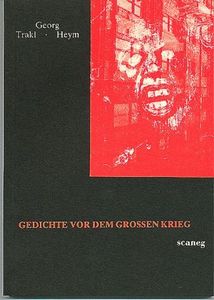World War I, Trakl was sent as a medical official to attend to soldiers in Galicia (comprising portions of modern-day Ukraine and Poland). Trakl suffered frequent bouts of depression[citation needed], exacerbated by the horror of caring for severely wounded soldiers. During one such incident in Grodek, Trakl had to steward the recovery of some ninety soldiers wounded in the fierce campaign against the Russians. He tried to shoot himself from the strain, but his comrades prevented him. Hospitalized in Krakow and placed under close observation, Trakl lapsed into deeper depression and wrote to Ficker for advice. Ficker convinced him to contact Wittgenstein. Upon receiving Trakl's note, Wittgenstein went to the hospital, but found that Trakl had committed suicide from an overdose of cocaine three days before.
Georg TRAKL , Born 3 Feb 1886 in Salzburg. Expressionist poet whose personal and wartime torments made him Austria's foremost elegist of decay and death. He influenced Germanic poets after both world wars. Moody and withdrawn, Trakl trained as a pharmacist at the University of Vienna (1908–10)—partly, perhaps, to gain access to narcotics, for by 1913 he was a confirmed addict. Other compulsions were an abnormal affection for his younger sister, Grete, and restless wanderlust. The patronage of a periodical publisher and of the philosopher Ludwig Wittgenstein, who secretly gave him part of a patrimony, enabled Trakl to devote himself to poetry; he brought out his first volume in 1913. The following year he became a lieutenant in the army medical corps and, in Galicia, was placed in charge of 90 serious casualties whose agonies he, as a mere dispensing chemist, could hardly relieve. One patient killed himself while Trakl watched helplessly; he also saw deserters being hanged. He either attempted or threatened to shoot himself in the aftermath of these horrors and was sent to a military hospital at Kraków for observation. There he died of an overdose of cocaine, perhaps taken inadvertently.
